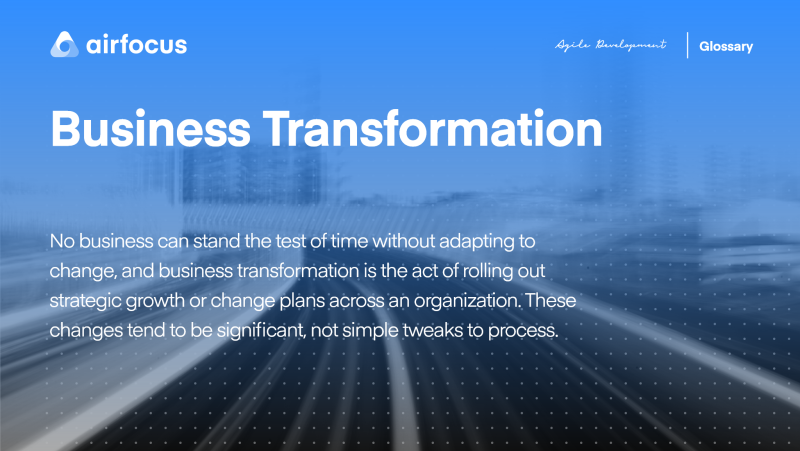Business Transformation
What is business transformation?
Definition of business transformation
No business can stand the test of time without adapting to change, and business transformation is the act of rolling out strategic growth or change plans across an organization. These changes tend to be significant, not simple tweaks to process.
Business transformation may occur as a result of the external change — e.g. shifts in the marketplace — or internal change, e.g. suboptimal company culture.
As you can imagine, this process can take months, if not years, to complete. However, with today’s advanced rate of development, time is often of the essence in business transformation.
What is business transformation used for?
A business transformation should always be a step in the right direction for an organization. As such, this organizational change could be sought with the aim of capturing a new segment of the market, adding commercial value to the business, improving production efficiencies, or maximizing human capital.
So why should product development teams know about business transformation?
In truth, product managers are often champions of internal change within their organization — even if they, or the rest of the company, don’t know it. Thanks to the unique position a product manager finds themselves in, they are well placed to not only spot opportunities to create value, but have the authority to suggest new and improved ways of working.
For product teams, a business transformation agenda could be pushed to better meet users’ needs or to monopolize on emerging technology.
Examples of business transformation
There is no ‘one size fits all’ approach to organizational change. How your business aims to transform itself will be entirely dependent on where you are right now, where you want to be and why.
That being said, there are a number of common business transformation types.
Organizational transformation
This type of business transformation focuses on a business’s most valuable asset: its people.
Organizational transformation is concerned with assessing how the company-wide team currents operate — what’s working, what isn’t working and opportunities for improvements. This could mean breaking down a hierarchical structure in favor of a flatter organization. It could mean upskilling staff, hiring new members, encouraging greater collaboration between teams or the dreaded ‘restructuring’.
Business process transformation
As the name suggests, this approach hones in on how the business runs day by day.
Whilst some business process transformations are entire overhauls of a company’s methods, processes, and working styles, this should also be an ongoing process. The worst thing leaders can do is to get stuck in the mindset that says: “But it’s always been done this way”. Business process transformation encourages the organization to closely assess where effort is being spent and what value is received in return.
Effort-heavy or repetitive tasks, or those that reap with little reward, should be redesigned or cut out entirely, if possible. As such, business process transformation may involve agile thinking.
Management transformation
Speaking of leaders, management transformation seeks to create a leadership structure that makes it easier for organizations to reach their potential.
For example, maybe it takes months for a decision to be agreed upon between stakeholders. Or, perhaps, there’s a great deal of bureaucracy and red tape for innovations to overcome. For a business to grow and adapt to necessary changes, its leadership needs to facilitate quick decision making.
Management transformation may empower team members to make decisions for themselves — without senior sign-off — or it may be used to invest in clearer communication channels, to speed the decision-making process up.
Information, data, or digital transformation
Technology has fundamentally changed the way that businesses operate, from digital communication or eCommerce to social media and CRM.
In this way, information, data, or digital transformations are intended to leverage what’s readily available to a business, to help it grow. A great example is the acceleration of customer data collection — these days, companies gather an overwhelming amount of data and what they choose to do with it can either improve their customer relationships or damage them beyond repair.
Cultural transformation
This final example of business transformation is arguably one of the hardest to get right.
Company culture is a living, breathing thing. It is reinforced by the decisions that leaders make in boardroom meetings, as well as how your customer service reps speak on the phone. As such, company culture is difficult to manage, but it is also absolutely vital for success.
A positive company culture empowers employees, drives productivity and attracts users to your brand. Negative company culture can, no exaggeration, be the death of your business.
What’s more: the company culture needs to evolve organically and over time. There is no overnight fix for toxic company culture. That’s why cultural transformation can be incredibly complex to roll out — it involves many moving pieces and relies on the right actions of all employees.
But cultural transformation is certainly not impossible, and many businesses — including Jaguar, for example — credit their commercial success to improvements in company culture.
What are some common challenges when undergoing business transformation?
First and foremost, any type of business transformation needs a clear plan and strategic vision. If you don’t know the ‘why’ behind the change you seek, you risk losing direction and momentum.
Equally, for a business transformation to succeed, it needs buy-in from all stakeholders. Sure, change typically starts from the top, but you won’t achieve company-wide transformation with the C-Suite alone. Engage each and every employee, share your plan and vision, and help them see the vital role they play in the transformation process.
Lastly, it can be comfortable and reassuring to stay within the status quo. You may even feel some resistance to business transformation plans. However, for your organization to be future-proof, it needs to be ready to change.
Product managers — as innovative thinkers and people managers — have a great deal of potential to encourage business transformation. In doing so, they’ll be helping maximize the value of their organization.

General FAQ

Glossary categories
Experience the new way of doing product management

Experience the new way of doing product management








